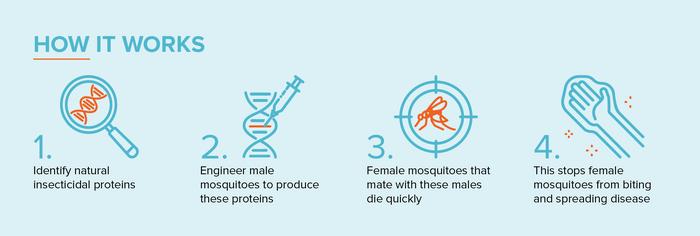Engineered Human Therapies
The Toxic Male Technique: Revolutionizing Mosquito Control
A new genetic biocontrol method promises to slash the lifespan of disease-carrying female mosquitoes, offering faster results than ever before
Jan 7, 2025
[DALL-E]
Almost 50% of the world's population resides in areas endemic to Malaria, and 2023 saw over 260 million cases of the disease, with more than 500,000 deaths. While arguably one of the worst vector-borne illnesses to plague this planet, Malaria is, unfortunately, one of dozens of diseases transmitted by mosquitoes to millions within our population. Vector control has been an ongoing strategy for decades but has been met with intermittent success.
Yet now, in a groundbreaking development, scientists have unveiled a novel biological pest control method that could dramatically curb the spread of insect-borne diseases such as malaria, dengue, and Zika. This innovative approach, known as the Toxic Male Technique (TMT), promises faster and more effective results than traditional methods, potentially transforming global health and agricultural pest management.
Published recently in Nature Communications, researchers from Applied BioSciences and the ARC Centre of Excellence in Synthetic Biology at Macquarie University describe the pioneering strategy. TMT employs genetically engineered male insects to produce insect-specific venom proteins in their semen. When these modified males mate with females, the venom proteins transfer, sharply reducing the females' lifespan and, consequently, their capacity to transmit diseases.

The Global Challenge of Insect Pests
Insect pests remain a formidable threat to public health and agriculture, causing hundreds of thousands of deaths, millions of infections, and billions in economic losses annually. Among these, mosquitoes—such as Aedes aegypti and Anopheles gambiae—are particularly dangerous. Only female mosquitoes bite and spread diseases like malaria, dengue, and yellow fever, making them the primary targets of pest control efforts.
Traditional methods, including pesticides, face mounting challenges. Resistance to chemicals has reduced their efficacy, while their use has harmed non-target species and ecosystems. Genetic biocontrol has emerged as a promising alternative, with techniques like the Sterile Insect Technique (SIT) and Release of Insects Carrying Dominant Lethal Genes (RIDL). However, these methods have limitations: although they disrupt reproduction, they don’t immediately reduce the population of biting females.
The TMT Advantage
Enter TMT, a technology that directly targets the females responsible for disease transmission. By immediately reducing the number of biting females, TMT achieves what other genetic methods cannot: rapid suppression of disease spread.
“As we’ve learned from COVID-19, reducing the spread of these diseases as quickly as possible is critical to preventing epidemics,” explains lead author Sam Beach. “TMT is the first biocontrol technology that could work as quickly as pesticides without harming beneficial species.”
Laboratory tests with fruit flies (Drosophila melanogaster) demonstrated the potential of TMT. Females that mated with TMT males experienced lifespans shortened by 37–64% compared to those mated with unmodified males. Computer models predict that applying TMT to Aedes aegypti could reduce blood-feeding rates by 40–60%, a dramatic improvement over existing methods.
Rigorous Safety Protocols
The development team has prioritized safety and environmental considerations. Venom proteins used in TMT are carefully chosen to target only invertebrates, ensuring they are non-toxic to mammals and unlikely to harm beneficial insects due to their low oral toxicity.
“We still need to implement it in mosquitoes and conduct rigorous safety testing to ensure there are no risks to humans or non-target species,” says Associate Professor Maciej Maselko, whose lab spearheaded the study.
The researchers are optimistic about the transformative potential of this breakthrough. “This innovative solution could reshape pest management, offering hope for healthier communities and a more sustainable future,” Beach concludes.
With rigorous testing and implementation, TMT could redefine pest control, marking a major stride toward controlling disease and fostering ecological sustainability.


















